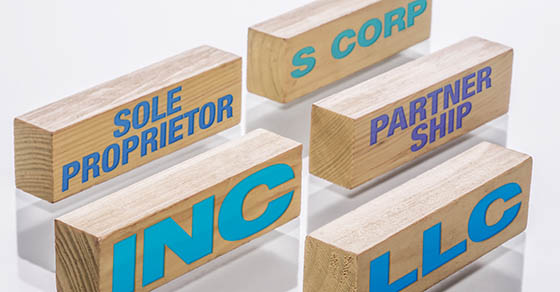If you’re planning to start a business or thinking about changing your business entity, you need to determine what will work best for you. Should you operate as a C corporation or a pass-through entity such as a sole-proprietorship, partnership, limited liability company (LLC) or S corporation? There are many issues to consider.
Currently, the corporate federal income tax is imposed at a flat 21% rate, while individual federal income tax rates currently begin at 10% and go up to 37%. The difference in rates can be alleviated by the qualified business income (QBI) deduction that’s available to eligible pass-through entity owners that are individuals, and some estates and trusts.
Individual rate caveats: The QBI deduction is scheduled to end in 2026, unless Congress acts to extend it, while the 21% corporate rate is not scheduled to expire. Also, noncorporate taxpayers with modified adjusted gross incomes above certain levels are subject to an additional 3.8% tax on net investment income.
Organizing a business as a C corporation instead of a pass-through entity may reduce the current federal income tax on the business’s income. The corporation can still pay reasonable compensation to the shareholders and pay interest on loans from the shareholders. That income will be taxed at higher individual rates, but the overall rate on the corporation’s income can be lower than if the business was operated as a pass-through entity.
More to take into account
There are other tax-related factors to take into consideration. For example:
- If most of the business profits will be distributed to the owners, it may be preferable to operate the business as a pass-through entity rather than a C corporation, since the shareholders will be taxed on dividend distributions from the corporation (double taxation). In contrast, owners of a pass-through entity will only be taxed once, at the personal level, on business income. However, the impact of double taxation must be evaluated based on projected income levels for both the business and its owners.
- If the value of the assets is likely to appreciate, it’s generally preferable to conduct business as a pass-through entity to avoid a corporate tax when the assets are sold or the business is liquidated. Although corporate level tax will be avoided if the corporation’s shares, rather than its assets, are sold, the buyer may insist on a lower price because the tax basis of appreciated business assets cannot be stepped up to reflect the purchase price. That can result in much lower post-purchase depreciation and amortization deductions for the buyer.
- If the business is a pass-through entity, an owner’s basis in his or her interest in the entity is stepped-up by the entity income that’s allocated to the owner. That can result in less taxable gain for the owner when his or her interests in the entity are sold.
- If the business is expected to incur tax losses for a while, you may want to structure it as a pass-through entity so you can deduct the losses against other income. Conversely, if you have insufficient other income or the losses aren’t usable (for example, because they’re limited by the passive loss rules), it may be preferable for the business to be a C corporation, since it’ll be able to offset future income with the losses.
- If the owner of a business is subject to the alternative minimum tax (AMT), it may be preferable to organize as a C corporation, since corporations aren’t subject to the AMT. Affected individuals are subject to the AMT at 26% or 28% rates.
As you can see, there are many factors involved in operating a business as a certain type of entity. This only covers a few of them. For more details about how to proceed in your situation, consult with us.
© 2023





